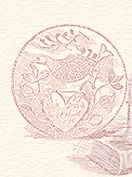Ihr liewe Leit:
Heit fangt der alt Professer aa mit re Froog-wer vun eich PD Leser
hen letscht Dunnerschdaag ken Boi/Pei gesse am End vum Dankdaagsesse?
Ich hab gude Aage, saag ich eich, un ich hab nie ken Hand in der
Heeh gsehne! Nee, wann ihr echde Deitsche sin, dann habt ihr gewiss Boi gesse.
Em Michael A. Gruber (1855-1943) sei Mudder hot immer Boi gebacke:
Ich kann mei Mudder sehne
Am Disch him Kiche-eck,
Die Pei-die gude, scheene-
Zurischde unne Fleck.
Der Frank W. Matz waar aa en guder Deitscher; in seim Nadurbuch hot
er mol gschriwwe:
"Schmals, Mehl, Frucht, un Allspice muss bei eb Boi gebacke kann warre."
Un all des macht nadierlich der Deeg:
En Schtick Peideeg genumme,
Mit Mehl schee zammegschtickt,
En Rollhols noh druffkumme
Un breed, dinn ausgedrickt.
Sell dinn, ausgedrickder Deeg watt dann 's Fundament vum Boi, wie der Matz uns
saagt:
"Alsemol hen die Boi en hatt Fundament, un alsemol iss en Dach
druff; deel hen en offe Gsicht; annere hen Latte driwwergschpannt wie imme
Bresent; annere sin wie en Schneehaufe, frosted."
Ya, 's muss waahr sei; der Gruber hot gschriwwe:
Mit Deckel sin die menschde;
En paar, wie Kasstatt, uff;
Un deel-villeicht die schennschde-
Hen Schtreefe greitzweis druff.
Un nau muss der Boi nadierlich gebacke warre:
En guder gehitzder Offe,
Die Pei noh schnell hinei,
En paar mol hiegeloffe
Un gewatscht die Backerei.
Dr Matz:
"Deel Weibsleit, wann sie Boi backe, duhne's Dach marricke mit me
gleene Raadli. Ee Greitz meent Ebbelboi; zwee Greitz Kasche; drei Greitz
'Black"-biere; vier Greitz Roseine; un en grosser Ring meent Minsboi."
Der Gruber:
Die Pei sin endlich faddich,
Fer yeder Iems en Pei,
Un yedi Aart abbaddich
Gemarrickt was sie sei.
"Yeder Iems"? Nadierlich!
Fer schiergaar fuffzich Yaahre
Uff ihrem Disch so fei
Bei yeder Iemszeit waare
Mei Mudder ihre Pei.
Un sell meent fer's Friehschtick/Marrige-esse, Dinner, un Sabber/Nachtesse!
Macht's gut,
Der Alt Professer
|
Dear people:
Today the Old Professor is going to start with a question-who of
you PG readers on last Thursday ate no pie at the end of Thanksgiving
dinner?
I have good eyes, I tell you, and I never saw no hand raised in the
air! No, if you are genuine PGs, then you certainly ate pie. Michael A.
Gruber's (1855-1943) mother always baked pie:
I can see my mother
At the table in the kitchen corner,
The pies-the good and beautiful-
She is preparing without flaw.
Frank W. Matz was also a good PG; in his Book of Nature he once
wrote:
"Lard, flour, fruit, and allspice must be gathered before pie can be
baked."
And all of that naturally makes the dough:
A piece of pie dough is taken,
Nicely stuck together with flour,
A rolling pin is then put up on it
And it is pressed out broad and thin.
That thin, pressed-out dough then becomes the foundation for the
pie, as Matz tells us:
"Sometimes the pies have a hard bottom, and sometimes there is a
'roof' on it; some have an open face; others have laths (bars) over them
as in a prison; others are like a snowpile, frosted."
Yes, it must be true; Gruber wrote:
With covers are the most;
A few, like custard, open:
And some-perhaps the most beautiful-
Have strips criss-cross on them.
And now the pie must naturally be baked;
A good, heated oven,
The pies quickly in,
A few times you walk over
And watch the baking.
Matz:
"Some women, when they are baking pies, mark the cover (top) of the
pie with a little wheel. One cross means apple pie; two crosses, cherry;
three crosses, blackberry; four crosses, raisin; and a big ring means
mince pie."
Gruber:
The pies are finally finished/done,
For every meal a pie,
And every kind especially
Marked what they are.
"Every meal"? Of course!
For almost fifty years
On her table so fine
At every meal were
My mother's pies.
And that means for breakfast, dinner (PG for lunch), and supper (PG
for dinner)!
Take care,
The Old Professor |













